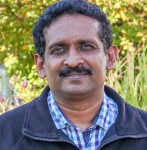It’s a very cold March in New York, ice and snow piled up on the street. The atmosphere at the Church Centre for the United Nations which is opposite to the iconic UN General Assembly is celebratory. Women throng the lobby, in colourful attire and determined in their purpose, attending the myriad meetings the building is playing host to during the UN’s 61st Commission on the Status of Women (CSW). The ACT Office is located on the 9th floor of the same building. It is a privilege to overhear the heated discussions that continue to the elevators ranging from patriarchy, to religion to female genital mutilation.
The ACT Alliance Community of Practice on Gender Justice sits together discussing the details that should go into the ACT Alliance oral statement which is to be presented to the CSW. Brilliant, passionate and committed feminists from the membership of the ACT Alliance, like Gunilla Hallonsten, Elsebeth Gravgaard, Rabia Waqar, Clare Paine and Rita Muyambo, among others, craft the document.
It is a moment where I personally feel privileged to be in the presence of such committed and inspiring people. Women who have devoted their lives to the cause of women’s empowerment. Women who have challenged patriarchy, and continue to do so every day. Representing the women in a faith movement that has not only questioned patriarchal attitudes in religious and faith discourses, but engendered a feminization of faith based world views. A view where women’s rights and human rights take center stage, where bold interpretations of faith take place, unfettered.
The statement takes shape, we try to put into 2 pages the myriad issues that are important, an exercise that is taxing, as all issues are important, each interrelated with the other. We have our limitations. The oral statement is only 3 minutes long, and we need to prioritize.
The group underlines that one of the key areas we as faith based actors need to address head-on is the issue of parallel legal systems based on custom or religion which are excessively influential in many countries. These systems negatively impact women’s legal rights and economic empowerment. Child marriage and other harmful practices, which are often upheld by customary law practices, hinder education and sexual and reproductive health and rights of women and girls.
The stand of ACT is unequivocal, “A re-engagement with the parallel legal systems and re-interpretations of religious narratives is crucial for ensuring women’s and girls’ economic empowerment, and can lead to effectively challenging and ultimately dismantling patriarchy.
“ACT Alliance emphasizes the positive role that faith, and communities of faith, can play in achieving gender justice. ACT is a progressive faith voice advocating globally on gender justice to counter the misuse of religion by certain groups that undermine the rights of women and girls.”
The statement recognizes the collaborative efforts to empower women as actors in the political sphere, including the need to engage men and boys to address harmful and discriminatory social norms and practices. ACT emphasizes the need for women to have an equal social and legal status so they can powerfully participate in the full realization of human rights and in the fulfillment of Agenda 2030. The full oral statement can be found on the ACT website.
The presentation of the oral statement was delayed. Rabia Waqar, who was to present the oral statement to the CSW was speaking at another event, when we were informed that the ACT Alliance statement would be called to be presented. I was given the honour to present the statement, an honour not because of the event in which it was being presented, but because of the women from the ACT Alliance and its partners that the statement represented.
The statement is a testament to those women and men who strive hard to break down barriers of patriarchy, to make women’s equality and human rights a reality.
_____________
 Anoop Sukumaran, is the ACT Alliance Regional Representative in Asia and the Pacific
Anoop Sukumaran, is the ACT Alliance Regional Representative in Asia and the Pacific